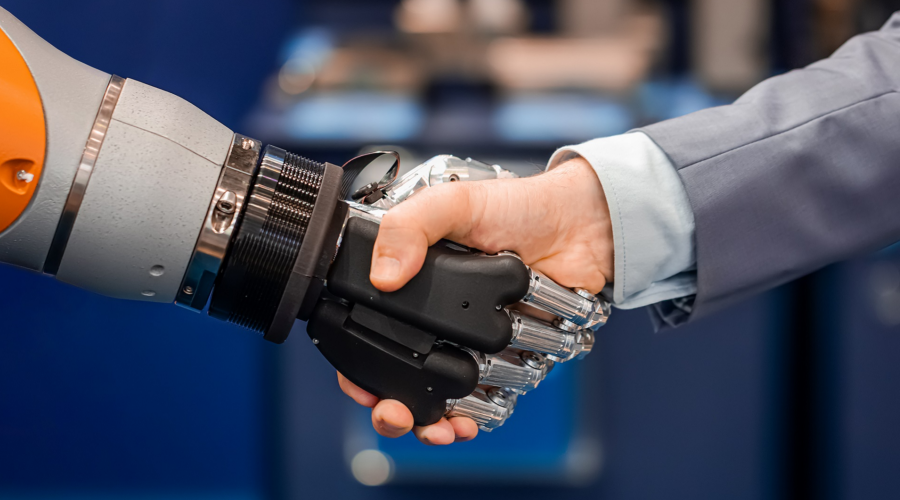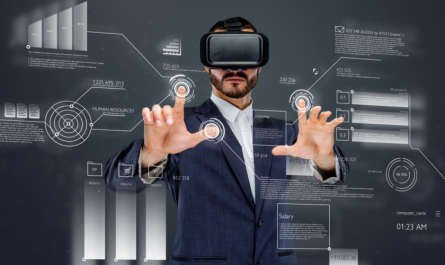Artificial Intelligence (AI) is rapidly changing the business landscape, revolutionizing industries with smarter, faster, and more efficient solutions. From automating repetitive tasks to enhancing customer experiences, AI is becoming an essential part of modern business strategies.
In this blog post, we’ll explore how AI is reshaping key industries and what the future holds for businesses that embrace this technology.
1. AI in Healthcare: Enhancing Diagnosis and Treatment
The healthcare industry is undergoing a digital transformation thanks to AI. Machine learning algorithms are being used to analyze medical data, detect patterns, and predict patient outcomes with greater accuracy. AI-powered diagnostic tools can identify diseases like cancer in early stages, improving treatment outcomes.
Future Outlook: AI will play a crucial role in personalized medicine, where treatments are tailored to individual patients based on their genetic profiles.
2. AI in Finance: Automating Trading and Risk Management
In the finance sector, AI is optimizing trading algorithms and improving risk management. AI can process vast amounts of financial data in real time, identifying trends and making predictions that human analysts may miss. Robo-advisors are also becoming popular, offering personalized investment advice based on user preferences and goals.
Future Outlook: AI will continue to improve fraud detection, automate compliance processes, and offer smarter financial planning tools for consumers and institutions alike.
3. AI in Retail: Revolutionizing Customer Experiences
AI is revolutionizing the retail industry by offering personalized shopping experiences. From AI-powered chatbots to smart recommendation engines, retailers are using data to understand customer preferences and behaviors. AI can also optimize supply chains by predicting demand, reducing waste, and increasing operational efficiency.
Future Outlook: Expect more immersive shopping experiences with AI-powered virtual try-ons and further integration of AI with e-commerce platforms for seamless purchasing.
4. AI in Manufacturing: Increasing Efficiency with Automation
AI-driven automation is transforming the manufacturing industry by increasing efficiency, reducing errors, and lowering costs. AI-powered robots can work 24/7 on the production line, handling tasks that require precision and speed. By identifying issues before they lead to breakdowns, predictive maintenance, powered by AI, aids manufacturers in preventing equipment failures.
Future Outlook: Smart factories will become the norm, where AI systems monitor and optimize the entire manufacturing process in real-time, improving productivity and reducing waste.
5. AI in Marketing: Data-Driven Campaigns and Personalization
Marketers are leveraging AI to run more targeted, data-driven campaigns. AI can analyze vast amounts of consumer data to predict which marketing strategies will work best. Personalization engines use AI to deliver highly relevant content, ads, and product recommendations to individual customers based on their behavior.
Future Outlook: AI will continue to evolve in marketing, offering even deeper insights into customer preferences and automating more aspects of digital campaigns.
6. AI in Transportation: Advancing Autonomous Vehicles
AI is making significant strides in the transportation industry, particularly with autonomous vehicles. Self-driving cars, trucks, and drones are on the horizon, with AI systems controlling navigation, obstacle detection, and decision-making in real-time. AI is also being used in traffic management systems to reduce congestion and improve road safety.
Future Outlook: Fully autonomous vehicles will likely reshape logistics and transportation industries, reducing delivery times and improving efficiency in goods transport.
7. AI in Human Resources: Streamlining Recruitment and Training
AI is helping companies streamline recruitment and employee training. AI-driven tools can quickly scan resumes, match candidates to jobs, and even conduct initial interviews through chatbots. In employee training, AI-powered platforms can tailor learning modules to individual skill sets, providing personalized development plans.
Future Outlook: AI will become an even bigger part of human resources, with more advanced tools for employee engagement, retention, and performance evaluation.
8. AI in Agriculture: Boosting Productivity and Sustainability
AI is also making a big impact in agriculture. Farmers are using AI tools to monitor crops, analyze soil conditions, and optimize irrigation. Drones equipped with AI can survey large fields, providing data to help farmers make informed decisions about planting and harvesting.
Future Outlook: AI will play a vital role in sustainable farming practices, helping farmers increase yields while reducing the environmental impact of agriculture.
Final Thoughts: The Growing Role of AI Across Industries
The integration of AI across industries is accelerating, and businesses that adopt AI technologies stand to gain a competitive edge. AI is not only streamlining processes but also unlocking new opportunities for growth, innovation, and customer satisfaction. As AI continues to evolve, its transformative potential will only increase, reshaping the future of business. Businesses that embrace AI will lead the way into a smarter, more efficient future.







